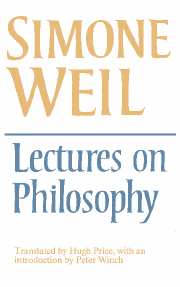1 - The materialist point of view
Published online by Cambridge University Press: 09 December 2009
Summary
‘We should allow what is vile
in us to find its own level,
so that what is noble and fine
can rise upwards.’
(Simone Weil, Gravity and Grace)Method in psychology
I Study of the ways in which thought in other people shows itself (objective psychology). Actions: reflex (from an external point of view everything is at the level of reflexes), custom, habit, voluntary actions.
II Study of oneself (introspection).
A. Introspection is a particular psychological state, incompatible with other psychological states.
1. With thinking about the world (astronomy, physics) and with theoretical speculation (mathematical reasoning).
2. With action, at least with voluntary action, for some involuntary actions do not exclude observations of oneself. But all actions which demand attention (sport, art, work) are incompatible with introspection. For example, the voluntary actions of Corneille's heroes are incompatible with introspection: if Rodrigue had analysed his state of mind after he had learned of the way his father had been insulted, he would have seen there nothing but despair, and he would have done nothing.
3. With a very strong emotion.
Examples: love at first sight in Racine's Phaedra, fear, deep joy, anger etc.
To sum up, thought, action, emotion exclude examination of oneself. Whenever, in life, one is actively involved in something, or one suffers violently, one cannot think about oneself.
Conclusion: since almost everything escapes self-observation, one cannot draw general conclusions from introspection.
- Type
- Chapter
- Information
- Lectures on Philosophy , pp. 27 - 89Publisher: Cambridge University PressPrint publication year: 1978



